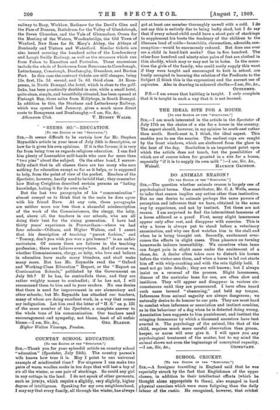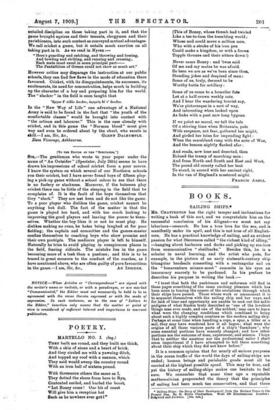SCHOOL CRICKET.
[To THE EDITOR OP THE " SPRC rAro rt."1 SIR,—A foreigner travelling in England said that he was especially struck by the fact that Englishmen of the upper classes, in addition to their intellectual efforts (which he thought alone appropriate to them), also engaged in hard physical exercises which were more fatiguing than the daily labour of the rustic. He recognised, however, that cricket
entailed discipline on those taking part in it, and that the game brought squires and their tenants, clergymen and their parishioners, into such contact as conveyed mutual advantages. We call cricket a game, but it entails much exertion on all taking part in it. As we read in Nyren
" Here's guarding and catching, and throwing and tossing, And bowling and striking, and running and crossing; Each mate must excel in some principal part— The Pentathlum of Greece could not show so much art."
However critics may disparage the instruction at our public schools, they can find few flaws in the mode of education there favoured. Cricket, with its disappointments, its successes, its excitements, its need for concentration, helps much in building up the character of a boy and preparing him for the world. The " slacker" in the field is soon taught that
'Epyov 3' obbh, b'vet3os, iceryein 3reibos.
In the "New Way of Life" one advantage of a National Army is said to be found in the fact that " the youth of the comfortable classes" would be brought into contact with "the artisan and labourer." This is the case already with cricket, and in this game the " Norman blood" must give way and even be ordered about by the churl, who excels in liam Vicarage, Ashbourne.







































 Previous page
Previous page